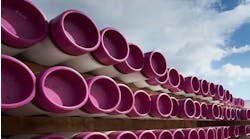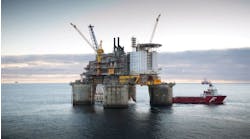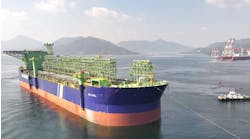By Reuters
ALICANTE, Spain — An underwater pipeline to carry green hydrogen between Spain and France will cost about 2.5 billion euros (US$2.6 billion), Spanish Prime Minister Pedro Sanchez said Dec. 9, adding he hoped the EU would partly fund the project.
The decision to pursue the project comes as an energy crisis caused by the war in Ukraine has accelerated European plans to bolster renewable energy as an alternative to Russian gas.
The corridor will make Iberia "a major energy hub" and form part of a "European hydrogen backbone" allowing the block to pump hydrogen across the continent as it seeks to produce 10 MMtonnes of clean hydrogen per year and import a further 10 MMtonnes by 2030, European Commission President Ursula von der Leyen said.
"Hydrogen is a game changer for Europe," von der Leyen added. "We want to make hydrogen a central part of our energy system in the transition to climate neutrality."
Green hydrogen is made from electrolyzers powered by renewable energy. Portuguese Prime Minister Antonio Costa said the Iberian peninsula's abundance of sunshine and wind used for renewable energy would make producing the hydrogen competitive.
French President Emmanuel Macron said the pipeline could also be used to send hydrogen produced in France from nuclear energy—so-called red hydrogen—in the opposite direction.
Reuters reported earlier that the undersea part of the 455-km (280-mile) pipeline would cost about 2 billion euros (US$2.1 billion), rising to 3 billion euros (US$3.1 billion) depending on its route.
An additional pipeline connecting Spain and Portugal will cost 350 million euros (US$369 million), according to a document provided by Spain.
The submarine section will be known as BarMar, while the entire hydrogen corridor connecting Spain and Portugal to France will be called H2MED, Sanchez confirmed.
Sanchez said France, Spain and Portugal would apply for EU funds to pay for up to 50% of H2MED's cost. The other half would be funded by the three countries' national grids, but the project also aims to attract private investment, Spanish government sources added.
The submarine pipeline was proposed in October as a substitute for the so-called MidCat gas pipeline project across the Pyrenees. It had been championed by Spain and Portugal, which said it could relieve immediate pressure on gas supplies.
Paris opposed the plan, arguing that two existing pipelines across the Pyrenees, which divide the Iberian Peninsula from France, were already under-utilized.
The new underwater pipeline was originally proposed to carry some natural gas as well but will now only carry hydrogen to meet EU funding criteria, Costa said.
Some observers are skeptical about H2MED's chances of success. Faig Abbasov, shipping program director with Transport & Environment, a Brussels-based NGO, labeled it "window dressing" to reduce political tensions raised by MidCat.
"If you already have an overland pipeline, why build an undersea pipeline?" Abbasov said. "Spain would be better off exporting by sea."
12.09.2022




